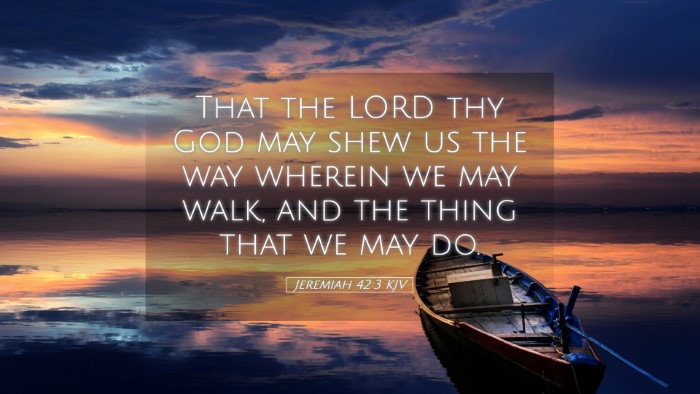Commentary on Jeremiah 42:3
Verse: "That the Lord thy God may show us the way wherein we may walk, and the thing that we may do."
Introduction
Jeremiah 42:3 encapsulates a plea from the remnant of Israel for divine guidance following the tumultuous events of the Babylonian exile. This verse is critical in understanding the relationship between Israel and God, especially in moments of uncertainty. By examining commentaries from notable figures like Matthew Henry, Albert Barnes, and Adam Clarke, we can draw deeper insights into the meanings and applications of this text.
The Context of Jeremiah 42
The chapter depicts the aftermath of Jerusalem's fall. The people, fearful and disoriented, approached Jeremiah, seeking direction from the Lord. This verse is part of their earnest request, showcasing their recognition of God's sovereignty and their need for His guidance in a time of crisis.
- Historical Background: After the Babylonians conquered Jerusalem, many Israelites were left vulnerable. In this context, their plea indicates a yearning for stability and direction.
- Theological Significance: The need for divine guidance emphasizes a fundamental aspect of faith, the dependence on God's wisdom in decision-making.
Insights from Matthew Henry
Matthew Henry emphasizes the importance of seeking God’s guidance. He notes that the Israelites are not merely looking for advice but are urging the Lord to reveal the specific path they should take:
"They desire a token for good; they seek direction, not just any direction but the way wherein they may walk, the course that is suited to their condition."
- Faith in God’s Leadership: Henry comments on the accountability attached to seeking God. When we ask for His leading, we must be prepared to walk according to that leading.
- Application of Prayer: He sees this as a model of prayer for believers, illustrating the necessity of constant, earnest supplication for God's guidance in every aspect of life.
Insights from Albert Barnes
Albert Barnes highlights the humility embedded in this request. He notes that the plea reflects a recognition of their past mistakes and a desire to amend their ways:
"The request shows their despair and helplessness, coupled with a sincere desire to know what is right and pleasing to God."
- Spiritual Condition: Barnes illustrates that this moment signifies a turning back to God—a necessary heart posture before receiving guidance.
- Dependency on Divine Wisdom: He posits that this verse encapsulates the essence of true repentance: acknowledging one's need for God’s wisdom over human reasoning.
Insights from Adam Clarke
Adam Clarke provides a scholarly perspective on the verse, drawing attention to the grammatical structure and implications of the phrasing:
"The expression indicates an active pursuit of God’s will, which is crucial for understanding the direction in which one must proceed."
- Understanding of 'The Way': Clarke dissects the word 'way' as a metaphor for life choices and paths, warning against complacency in spiritual matters.
- The Call to Action: He emphasizes that prayer for direction must be accompanied by a readiness to act upon the guidance received—highlighting faith in action.
Practical Applications for Modern Believers
In light of these insights, there are profound applications for today’s Christians, scholars, and pastors:
- Seeking Guidance: Like the Israelites, believers are encouraged to earnestly seek the Lord in prayer, trusting that He will reveal the right path amid uncertainty.
- Posture of Humility: Acknowledging our limitations in understanding fosters a deeper relationship with God and provides a clearer perspective on our need for His wisdom.
- Acting on Divine Direction: When guidance is received, it is essential for believers to take steps in faith, demonstrating trust in God's plan.
Conclusion
Jeremiah 42:3 offers a timeless message about the necessity of seeking divine guidance. Through the commentaries of Matthew Henry, Albert Barnes, and Adam Clarke, we glean insights into the importance of approaching God with earnestness, humility, and a readiness to act. This verse continues to speak to the hearts of those navigating the complexities of life, emphasizing faith in God’s perfect will amid uncertainty.


